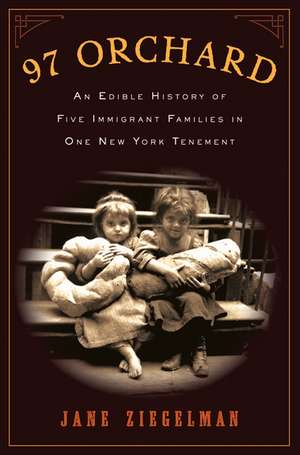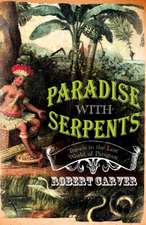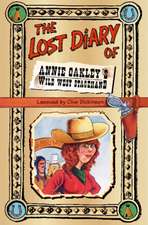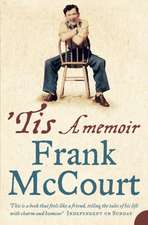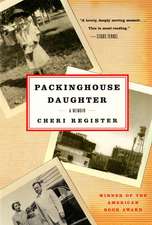97 Orchard: An Edible History of Five Immigrant Families in One New York Tenement
Autor Jane Ziegelmanen Limba Engleză Hardback – 31 mai 2010
Vezi toate premiile Carte premiată
IACP Crystal Whisk Award (2011)
97 Orchardis a richly detailed investigation of the lives and culinary habits—shopping, cooking, and eating—of five families of various ethnicities living at the turn of the twentieth century in one tenement on the Lower East Side of Manhattan. With 40 recipes included,97 Orchardis perfect for fans of Rachel Ray’sHometown Eats; anyone interested in the history of how immigrant food became American food; and “foodies” of every stripe.
Preț: 154.29 lei
Nou
Puncte Express: 231
Preț estimativ în valută:
29.52€ • 30.91$ • 24.43£
29.52€ • 30.91$ • 24.43£
Carte indisponibilă temporar
Doresc să fiu notificat când acest titlu va fi disponibil:
Se trimite...
Preluare comenzi: 021 569.72.76
Specificații
ISBN-13: 9780061288500
ISBN-10: 0061288500
Pagini: 272
Dimensiuni: 152 x 229 x 24 mm
Greutate: 0.46 kg
Editura: HarperCollins Publishers
Colecția Smithsonian
Locul publicării:New York, NY
ISBN-10: 0061288500
Pagini: 272
Dimensiuni: 152 x 229 x 24 mm
Greutate: 0.46 kg
Editura: HarperCollins Publishers
Colecția Smithsonian
Locul publicării:New York, NY
Textul de pe ultima copertă
In97
Orchard,
Jane
Ziegelman
explores
the
culinary
life
that
was
the
heart
and
soul
of
New
York's
Lower
East
Side
around
the
turn
of
the
twentieth
century—a
city
within
a
city,
where
Germans,
Irish,
Italians,
and
Eastern
European
Jews
attempted
to
forge
a
new
life.
Through
the
experiences
of
five
families,
all
of
them
residents
of
97
Orchard
Street,
she
takes
readers
on
a
vivid
and
unforgettable
tour,
from
impossibly
cramped
tenement
apartments
down
dimly
lit
stairwells
where
children
played
and
neighbors
socialized,
beyond
the
front
stoops
where
immigrant
housewives
found
respite
and
company,
and
out
into
the
hubbub
of
the
dirty,
teeming
streets.
Ziegelman shows how immigrant cooks brought their ingenuity to the daily task of feeding their families, preserving traditions from home but always ready to improvise. While health officials worried that pushcarts were unsanitary and that pickles made immigrants too excitable to be good citizens, a culinary revolution was taking place in the streets of what had been culturally an English city. Along the East River, German immigrants founded breweries, dispensing their beloved lager in the dozens of beer gardens that opened along the Bowery. Russian Jews opened tea parlors serving blintzes and strudel next door to Romanian nightclubs that specialized in goose pastrami. On the streets, Italian peddlers hawked the cheese-and-tomato pies known aspizzarelli, while Jews sold knishes and squares of halvah. Gradually, as Americans began to explore the immigrant ghetto, they uncovered the array of comestible enticements of their foreign-born neighbors.97 Orchardcharts this exciting process of discovery as it lays bare the roots of our collective culinary heritage.
Ziegelman shows how immigrant cooks brought their ingenuity to the daily task of feeding their families, preserving traditions from home but always ready to improvise. While health officials worried that pushcarts were unsanitary and that pickles made immigrants too excitable to be good citizens, a culinary revolution was taking place in the streets of what had been culturally an English city. Along the East River, German immigrants founded breweries, dispensing their beloved lager in the dozens of beer gardens that opened along the Bowery. Russian Jews opened tea parlors serving blintzes and strudel next door to Romanian nightclubs that specialized in goose pastrami. On the streets, Italian peddlers hawked the cheese-and-tomato pies known aspizzarelli, while Jews sold knishes and squares of halvah. Gradually, as Americans began to explore the immigrant ghetto, they uncovered the array of comestible enticements of their foreign-born neighbors.97 Orchardcharts this exciting process of discovery as it lays bare the roots of our collective culinary heritage.
Recenzii
Social history is, most elementally, food history. Jane Ziegelman had the great idea to zero in on one Lower East Side tenement building, and through it she has crafted a unique and aromatic narrative of New York’s immigrant culture: with bread in the oven, steam rising from pots, and the family gathering round. — A.J. Jacobs, New York Times bestselling author of The Know-It-All
“An engaging and delicious slice of life on the Lower East Side. And the recipes found in this book, though originating from various cultures, all have the air of comfort foods and home.” — Joan Nathan, author of Jewish Cooking in America
“What do just-arrived immigrants see as they gaze around a new land, and what do their native-born neighbors see as they newcomers make their presence felt? More practically: How do people begin the work of putting food on their tables amid unfamiliar streets and languages? These questions couldn’t be more timely. Nor could Jane Ziegelman’s penetrating exploration of them. You will come away with a renewed sense of what it means to be an American.” — Anne Mendelson, author of Milk and Stand Facing the Stove
“A truly fine idea. It not only opens a window to view the ways in which our nation’s immigrants cooked and ate, it broadens and enriches our understanding of the entire immigrant experience. This book is an impressive contribution to American cultural history.” — Nach Waxman, Kitchen Arts & Letters, New York City
“Jane Ziegelman brings us into the kitchens of five women whose home cooking not only fed their families and their neighborhoods but became part of the culinary DNA of America itself. Drawing on wonderfully evocative primary sources, Ziegelman describes how they contributed to the complexities of ethnic identity, class, and religion in a tumultuous city. Beautifully written and full of insights, 97 Orchard makes it clear that the story of New York is overwhelmingly a story about buying, selling, cooking, eating, and sharing food.” — Laura Shapiro, author of Perfection Salad: Women and Cooking at the Turn of the Century
“In this compelling foray into forensic gastronomy, Ziegelman pulls the facade off the titular 97 Orchard Street tenement. The result is a living dollhouse that invites us to gaze in from the sidewalk.With minds open and mouths agape, we witness the comings and goings of the building’s inhabitants in the years surrounding the turn of the twentieth century. By focusing on the culinary lives of individuals from a variety of ethnic groups, Ziegelman pieces together a thorough sketch of Manhattan’s Lower East Side at a time when these immigrants were at the forefront of a rapidly changing urban life. The food facts she uncovers are sure to interest and astound even those outside the culinary community, and guarantee that the reader will never look at a kosher dill pickle, a wrapped hard candy, or even the delectable foie gras the same way again. Ziegelman cleverly takes this opportunity to show us that in learning about food, we’re actually learning about history—and when it comes to the sometimes surprising journey some of our favorite meals have taken to get here, it’s fascinating stuff.” — Booklist
“This whole book is a celebration of food, language, and of the mutual aid and comfort that these brave pioneers shared with their tenement neighbors and the citizens who took them in.” — Julie Wittes Schlack, The Boston Globe
“Blending history, sociology, anthropology and economics, spiced with recipes, Ziegelman offers a looks at the Lower East Side and the immigrants who made it legendary.” — Chicago Jewish Star
“It is an eye-opening exploration of the social and economic history of those who thrived and survived, in spite of significant odds, on New York’s Lower East Side. VERDICT Recommended for those seeking up-close and personal—as well as edible—insights into the daily lives of late 19th- and early 20th-century ‘new Americans.’” — Library Journal
“A welcome addition to the canon inspired by the Tenement Museum on the Lower East Side. . . . [Ziegelman] dishes delectable morsels of ethnic gastronomy.” — New York Times
“Ziegelman puts a historical spin to the notion that you are what you eat. . . . Ziegelman vividly renders a proud, diverse community learning to be American. Through food, the author records the immigrants’ struggle to reinterpret themselves in an American context and their reciprocal impact on American culture at large.” — Publishers Weekly
“Highly entertaining and deceptively ambitious.” — New York Times Book Review
“An engaging and delicious slice of life on the Lower East Side. And the recipes found in this book, though originating from various cultures, all have the air of comfort foods and home.” — Joan Nathan, author of Jewish Cooking in America
“What do just-arrived immigrants see as they gaze around a new land, and what do their native-born neighbors see as they newcomers make their presence felt? More practically: How do people begin the work of putting food on their tables amid unfamiliar streets and languages? These questions couldn’t be more timely. Nor could Jane Ziegelman’s penetrating exploration of them. You will come away with a renewed sense of what it means to be an American.” — Anne Mendelson, author of Milk and Stand Facing the Stove
“A truly fine idea. It not only opens a window to view the ways in which our nation’s immigrants cooked and ate, it broadens and enriches our understanding of the entire immigrant experience. This book is an impressive contribution to American cultural history.” — Nach Waxman, Kitchen Arts & Letters, New York City
“Jane Ziegelman brings us into the kitchens of five women whose home cooking not only fed their families and their neighborhoods but became part of the culinary DNA of America itself. Drawing on wonderfully evocative primary sources, Ziegelman describes how they contributed to the complexities of ethnic identity, class, and religion in a tumultuous city. Beautifully written and full of insights, 97 Orchard makes it clear that the story of New York is overwhelmingly a story about buying, selling, cooking, eating, and sharing food.” — Laura Shapiro, author of Perfection Salad: Women and Cooking at the Turn of the Century
“In this compelling foray into forensic gastronomy, Ziegelman pulls the facade off the titular 97 Orchard Street tenement. The result is a living dollhouse that invites us to gaze in from the sidewalk.With minds open and mouths agape, we witness the comings and goings of the building’s inhabitants in the years surrounding the turn of the twentieth century. By focusing on the culinary lives of individuals from a variety of ethnic groups, Ziegelman pieces together a thorough sketch of Manhattan’s Lower East Side at a time when these immigrants were at the forefront of a rapidly changing urban life. The food facts she uncovers are sure to interest and astound even those outside the culinary community, and guarantee that the reader will never look at a kosher dill pickle, a wrapped hard candy, or even the delectable foie gras the same way again. Ziegelman cleverly takes this opportunity to show us that in learning about food, we’re actually learning about history—and when it comes to the sometimes surprising journey some of our favorite meals have taken to get here, it’s fascinating stuff.” — Booklist
“This whole book is a celebration of food, language, and of the mutual aid and comfort that these brave pioneers shared with their tenement neighbors and the citizens who took them in.” — Julie Wittes Schlack, The Boston Globe
“Blending history, sociology, anthropology and economics, spiced with recipes, Ziegelman offers a looks at the Lower East Side and the immigrants who made it legendary.” — Chicago Jewish Star
“It is an eye-opening exploration of the social and economic history of those who thrived and survived, in spite of significant odds, on New York’s Lower East Side. VERDICT Recommended for those seeking up-close and personal—as well as edible—insights into the daily lives of late 19th- and early 20th-century ‘new Americans.’” — Library Journal
“A welcome addition to the canon inspired by the Tenement Museum on the Lower East Side. . . . [Ziegelman] dishes delectable morsels of ethnic gastronomy.” — New York Times
“Ziegelman puts a historical spin to the notion that you are what you eat. . . . Ziegelman vividly renders a proud, diverse community learning to be American. Through food, the author records the immigrants’ struggle to reinterpret themselves in an American context and their reciprocal impact on American culture at large.” — Publishers Weekly
“Highly entertaining and deceptively ambitious.” — New York Times Book Review
Notă biografică
Jane Ziegelman is the director of the Tenement Museum's culinary center and the founder and director of Kids Cook!, a multiethnic cooking program for children. Her writing on food has appeared in numerous publications, and she is the coauthor of Foie Gras: A Passion. She lives in Brooklyn, New York.
Premii
- IACP Crystal Whisk Award Finalist, 2011
